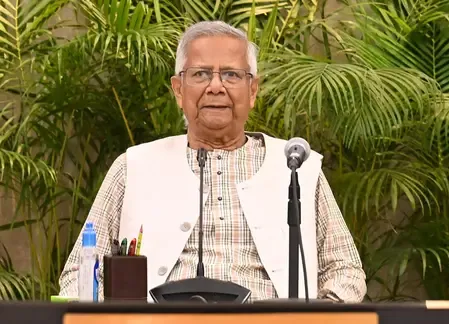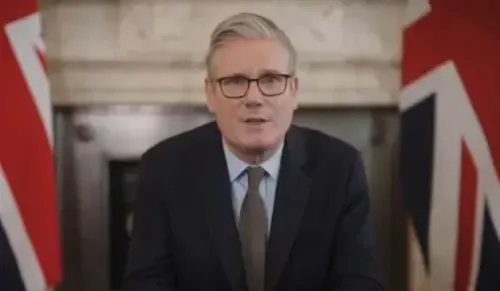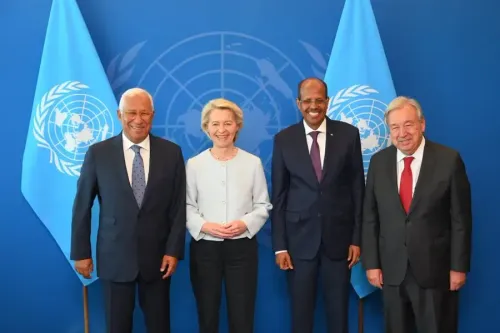Did UK, Australia, and Canada Just Recognize the State of Palestine?

Synopsis
Key Takeaways
- UK, Australia, and Canada formally recognize the State of Palestine.
- This decision revives discussions on the two-state solution.
- The recognition aligns these nations with many in the Arab world.
- It places pressure on the US and EU to reassess their positions.
- The Palestinian government expressed gratitude for the recognition.
London, Sep 21 (NationPress) In a synchronized diplomatic initiative prior to this week's pivotal United Nations General Assembly (UNGA) session, three prominent Western nations — the United Kingdom, Australia, and Canada — officially recognized the State of Palestine on Sunday, reigniting global discussions concerning the enduring two-state solution.
British Prime Minister Keir Starmer declared the UK's recognition of Palestine in a social media statement.
“Today, to rekindle the hope for peace for both Palestinians and Israelis, and a two-state solution, the United Kingdom formally acknowledges the State of Palestine,” UK PM Keir Starmer stated on X, indicating a shift in London's Middle Eastern policy.
Canadian Prime Minister Mark Carney mirrored this sentiment, providing a detailed statement from Ottawa.
“Since 1947, Canada has advocated for a two-state solution – Palestine and Israel coexisting peacefully and securely. Today, Canada recognizes the State of Palestine and extends our partnership in fostering the potential for enduring peace in the Middle East,” the Canadian PM noted on X.
“The current Israeli administration is systematically obstructing the establishment of a Palestinian state. It has aggressively pursued settlement expansion in the West Bank, which contravenes international law. Its ongoing military actions in Gaza have resulted in the deaths of tens of thousands of civilians, displaced over a million individuals, and caused a catastrophic and preventable famine, violating international law. The current Israeli government's stated policy is that ‘there will be no Palestinian state,'” he articulated in his press briefing.
“In this context, Canada recognizes the State of Palestine and offers our collaboration in creating a vision for a peaceful future for both the State of Palestine and the State of Israel,” he added.
Australia also participated in this coordinated recognition, with Prime Minister Anthony Albanese and Foreign Minister Penny Wong releasing a joint statement. They announced Australia's formal recognition of Palestine as an “independent and sovereign state,” reaffirming Canberra’s dedication to a two-state solution.
The statement emphasized that Hamas should play “no role in Palestine” and that the Palestinian Authority has pledged to implement reforms, including democratic elections, governance enhancements, and acknowledgment of Israel’s right to exist.
The acknowledgment by these three nations signifies one of the most substantial changes in Western policy regarding the Israeli-Palestinian conflict in decades. It positions them alongside numerous countries in the Arab world and the Global South, which have consistently supported Palestinian statehood.
As the UNGA convenes in New York this week, these synchronized announcements are likely to exert pressure on other nations, including the United States and European Union members, to reconsider their positions on Palestinian statehood.
The Palestinian government welcomed the announcement.
In a statement shared on X, Palestine's Mission to the United Nations expressed: "The Ministry of Foreign Affairs and Expatriates welcomes and appreciates the nations that have recognized the State of Palestine, namely the United Kingdom, Canada, and Australia, and views these courageous decisions as consistent with international law and legitimate resolutions."









